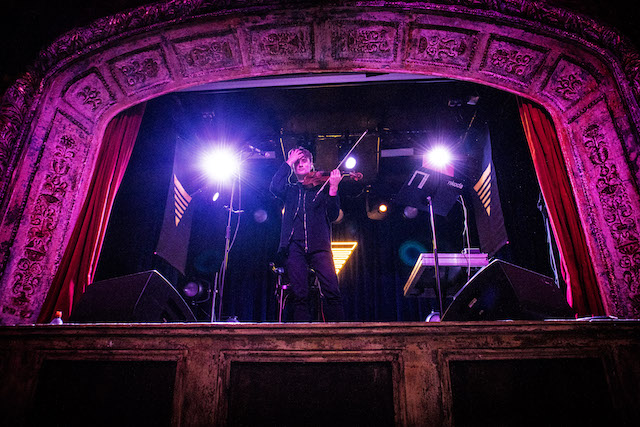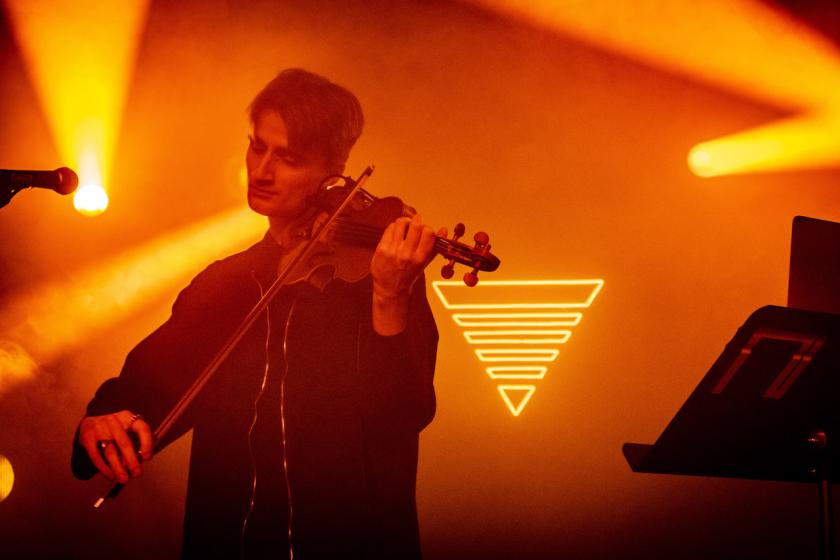When Roberts Balanas was at the Royal Academy of Music he was asked to perform something “different” for an open day. The Latvian violinist already had a reputation for being as experimental as he was virtuosic. He began with a rendition of the Andante from Bach’s Sonata 2 in A minor – a tricky polyphonic piece in which the violinist must accompany the melody with repeated notes on the lower string. Yet as the piece progressed he started to introduce some of his own harmonies, gently shifting the polyphony till it sounded more like something from…ABBA.
This witty, teasing musical hybrid emerged about halfway through the set Balanas performed for Through the Noise – the pioneering crowdfunded concert organiser – on Saturday night. He made his solo debut in the Wigmore Hall at the age of 16, yet there was no sense of displacement as he appeared in London Bridge’s Omeara nightclub with a programme that ranged from the Baroque fireworks of Locatelli to Steve Reich and Billy Eilish.
The centrepiece of the evening was Reich’s Violin Phase – famously one of numerous works in which the composer deployed the same “phasing” technique – which Balanas introduced as “probably the maddest piece I’ve ever played”. If his patter was playful, there was no doubting the rigour and intensity of the performance as he repeated a one bar sequence at a slightly different tempo from three recorded versions of the same sequence. The close acoustic of the nightclub heightened the sense of the piece as an auditory hallucination; different patterns started to emerge, with his part first becoming an echo and then a doubling of the recorded motif. At points it felt as if we were listening to a psychedelic heartbeat, enhanced by lighting that from time to time made the end of his bow glow like the tip of a cigarette.
The evening had begun with a piece by Locatelli, the 18th century violinist described by Balanas as the “original violin freak” who would go on to inspire Paganini. Locatelli wasn’t the only violinist from his time to push his instrument to its technical limits – Tartini his contemporary was also a great musical experimentalist – yet the former’s Capriccios are a benchmark for virtuoso violin playing. Balanas’s performance was so deft the notes seemed to swarm out of his violin like bees as his fingers shuttled seamlessly up and down the fingerboard. But the acoustic was not so brilliant here; for this particular piece the mike felt unnecessary and the overall impression was slightly harsh.
 Even so it was a persuasive demonstration of the technical pyrotechnics that have led to Balanas being sought out for collaborations with artists as diverse as Trevor Pinnock and Pink Floyd. The cross-fertilisation between classical and rock goes both ways. If his Bach ended up metamorphosing into ABBA, then his performance of Pink Floyd’s Another Brick In The Wall went from harsh bites of the bow on the strings to evoke the song’s angry defiance to passages with flourishes that were worthy of Paganini.
Even so it was a persuasive demonstration of the technical pyrotechnics that have led to Balanas being sought out for collaborations with artists as diverse as Trevor Pinnock and Pink Floyd. The cross-fertilisation between classical and rock goes both ways. If his Bach ended up metamorphosing into ABBA, then his performance of Pink Floyd’s Another Brick In The Wall went from harsh bites of the bow on the strings to evoke the song’s angry defiance to passages with flourishes that were worthy of Paganini.
For all the “tricks” there’s no sense of emptiness here – Balanas is a musician with as much heart as technical flair. Interestingly this came across most strongly in the last part of the evening when he brought out a six-string electronic violin, which for this had been programmed to bring together the sounds of a violin, drums and cello. He opened the section with a cover of Daniel Caesar’s song Best Part – which won the best collaboration at the 2018 Soul Train Music Awards and was included by Barack Obama in his 2019 summer playlist. In Balanas’s version the audience was serenaded with soulful cello notes before he soared into the melodic stratosphere.
Walt Whitman may have contained multitudes but Balanas could certainly take him on as his musical equivalent; by the end of the set he had also given us his electric violin version of Drake’s rap classic Hotline Bling and a humdinging rendition of Billy Eilish’s Wish You Were Gay. Though the pieces he played occupied spectacularly different places in the musical canon, each was played with the same sense of precision and fiery dedication.
This was the tenth Noisenight organised by Through the Noise, a brilliant initiative to bring classical music to clubs that has seen performances in recent months from instrumentalists including Abel Selaocoe and Sheku Kanneh-Mason. After an extremely successful year organising live gigs in London, it is now expanding its operation to cities across the UK. This gig was a demonstration of why what it’s doing is so important – while it was very different to most classical concerts there was no sense of gimmickry, this was serious music with a wave to the wild side. The atmosphere of excitement from the standing audience was matched by the intense concentration each time Balanas started playing, not least for the Reich. This is a welcome and dynamic addition to the classical music scene.














Add comment